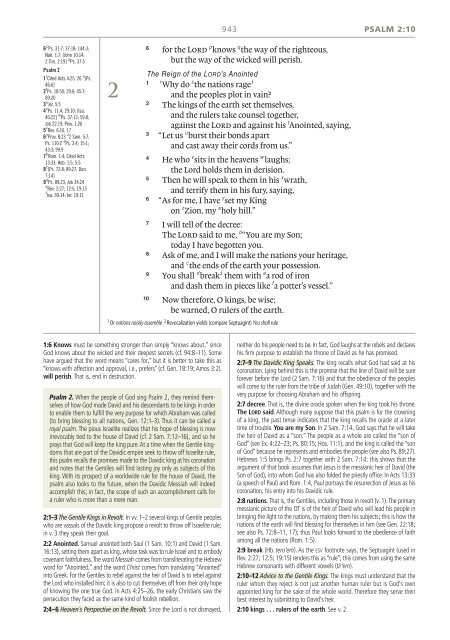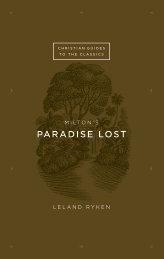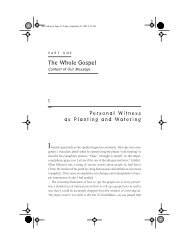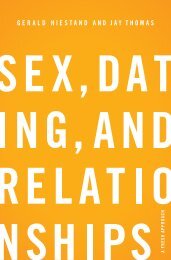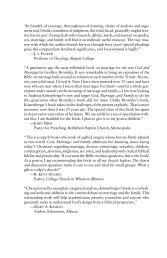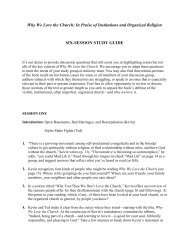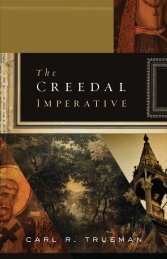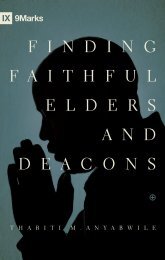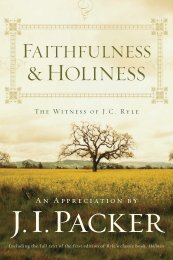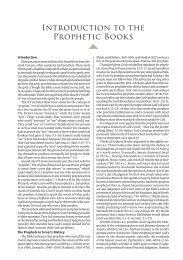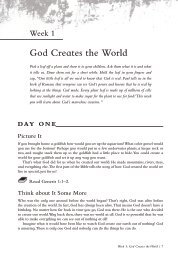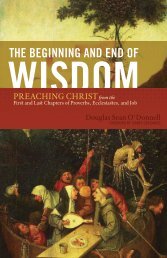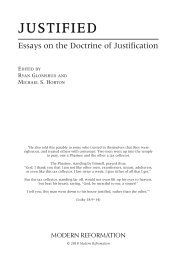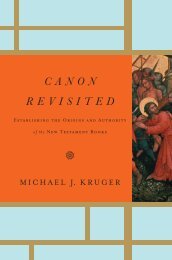ESV Study Bible Sample (Psalms) - Monergism Books
ESV Study Bible Sample (Psalms) - Monergism Books
ESV Study Bible Sample (Psalms) - Monergism Books
- No tags were found...
You also want an ePaper? Increase the reach of your titles
YUMPU automatically turns print PDFs into web optimized ePapers that Google loves.
943 Psalm 2:106 p Ps. 31:7; 37:18; 144:3;Nah. 1:7; [John 10:14;2 Tim. 2:19] q Ps. 37:5Psalm 21 r Cited Acts 4:25, 26 s [Ps.46:6]2 t Ps. 18:50; 20:6; 45:7;89:203 u Jer. 5:54 v Ps. 11:4; 29:10; [Isa.40:22] w Ps. 37:13; 59:8;Job 22:19; Prov. 1:265 x Rev. 6:16, 176 y Prov. 8:23 z 2 Sam. 5:7;Ps. 110:2 a Ps. 3:4; 15:1;43:3; 99:97 b Rom. 1:4; Cited Acts13:33; Heb. 1:5; 5:58 c [Ps. 72:8; 89:27; Dan.7:14]9 d Ps. 89:23; Job 34:24e Rev. 2:27; 12:5; 19:15f Isa. 30:14; Jer. 19:1126for the Lord p knows q the way of the righteous,but the way of the wicked will perish.The Reign of the Lor d’s Anointed1 r Why do s the nations rage 1and the peoples plot in vain?2The kings of the earth set themselves,and the rulers take counsel together,against the Lord and against his t Anointed, saying,3“Let us u burst their bonds apartand cast away their cords from us.”4He who v sits in the heavens w laughs;the Lord holds them in derision.5Then he will speak to them in his x wrath,and terrify them in his fury, saying,6“As for me, I have y set my Kingon z Zion, my a holy hill.”7I will tell of the decree:The Lord said to me, b “You are my Son;today I have begotten you.8Ask of me, and I will make the nations your heritage,and c the ends of the earth your possession.9You shall d break 2 them with e a rod of ironand dash them in pieces like f a potter’s vessel.”10Now therefore, O kings, be wise;be warned, O rulers of the earth.1 Or nations noisily assemble 2 Revocalization yields (compare Septuagint) You shall rule1:6 Knows must be something stronger than simply “knows about,” sinceGod knows about the wicked and their deepest secrets (cf. 94:8–11). Somehave argued that the word means “cares for,” but it is better to take this as“knows with affection and approval, i.e., prefers” (cf. Gen. 18:19; Amos 3:2).will perish. That is, end in destruction.Psalm 2. When the people of God sing Psalm 2, they remind themselvesof how God made David and his descendants to be kings in orderto enable them to fulfill the very purpose for which Abraham was called(to bring blessing to all nations, Gen. 12:1–3). Thus it can be called aroyal psalm. The pious Israelite realizes that his hope of blessing is nowirrevocably tied to the house of David (cf. 2 Sam. 7:12–16), and so heprays that God will keep the king pure. At a time when the Gentile kingdomsthat are part of the Davidic empire seek to throw off Israelite rule,this psalm recalls the promises made to the Davidic king at his coronationand notes that the Gentiles will find lasting joy only as subjects of thisking. With its prospect of a worldwide rule for the house of David, thepsalm also looks to the future, when the Davidic Messiah will indeedaccomplish this; in fact, the scope of such an accomplishment calls fora ruler who is more than a mere man.2:1–3 The Gentile Kings in Revolt. In vv. 1–2 several kings of Gentile peopleswho are vassals of the Davidic king propose a revolt to throw off Israelite rule;in v. 3 they speak their goal.2:2 Anointed. Samuel anointed both Saul (1 Sam. 10:1) and David (1 Sam.16:13), setting them apart as king, whose task was to rule Israel and to embodycovenant faithfulness. The word Messiah comes from transliterating the Hebrewword for “Anointed,” and the word Christ comes from translating “Anointed”into Greek. For the Gentiles to rebel against the heir of David is to rebel againstthe Lord who installed him; it is also to cut themselves off from their only hopeof knowing the one true God. In Acts 4:25–26, the early Christians saw thepersecution they faced as the same kind of foolish rebellion.2:4–6 Heaven’s Perspective on the Revolt. Since the Lord is not dismayed,neither do his people need to be. In fact, God laughs at the rebels and declareshis firm purpose to establish the throne of David as he has promised.2:7–9 The Davidic King Speaks. The king recalls what God had said at hiscoronation. Lying behind this is the promise that the line of David will be sureforever before the Lord (2 Sam. 7:16) and that the obedience of the peopleswill come to the ruler from the tribe of Judah (Gen. 49:10), together with thevery purpose for choosing Abraham and his offspring.2:7 decree. That is, the divine oracle spoken when the king took his throne.The Lord said. Although many suppose that this psalm is for the crowningof a king, the past tense indicates that the king recalls the oracle at a latertime of trouble. You are my Son. In 2 Sam. 7:14, God says that he will takethe heir of David as a “son.” The people as a whole are called the “son ofGod” (see Ex. 4:22–23; Ps. 80:15; Hos. 11:1), and the king is called the “sonof God” because he represents and embodies the people (see also Ps. 89:27).Hebrews 1:5 brings Ps. 2:7 together with 2 Sam. 7:14: this shows that theargument of that book assumes that Jesus is the messianic heir of David (theSon of God), into whom God has also folded the priestly office. In Acts 13:33(a speech of Paul) and Rom. 1:4, Paul portrays the resurrection of Jesus as hiscoronation, his entry into his Davidic rule.2:8 nations. That is, the Gentiles, including those in revolt (v. 1). The primarymessianic picture of the OT is of the heir of David who will lead his people inbringing the light to the nations, by making them his subjects; this is how thenations of the earth will find blessing for themselves in him (see Gen. 22:18;see also Ps. 72:8–11, 17); thus Paul looks forward to the obedience of faithamong all the nations (Rom. 1:5).2:9 break (Hb. tero‘em). As the esv footnote says, the Septuagint (used inRev. 2:27; 12:5; 19:15) renders this as “rule”; this comes from using the sameHebrew consonants with different vowels (tir‘em).2:10–12 Advice to the Gentile Kings. The kings must understand that theruler whom they reject is not just another human ruler but is God’s ownappointed king for the sake of the whole world. Therefore they serve theirbest interest by submitting to David’s heir.2:10 kings . . . rulers of the earth. See v. 2.


